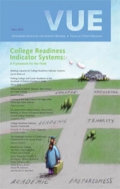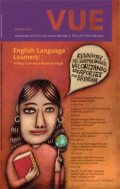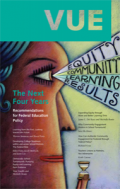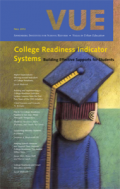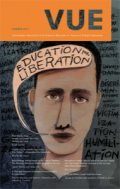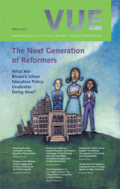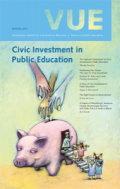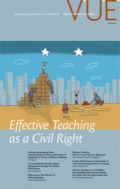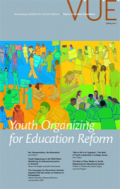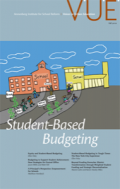VUE issues
AISR’s research, practitioner, and community partners reflect on lessons learned from three years of work on the College Readiness Indicator Systems project to identify students who are off track for college readiness and connect them to supports.
Rather than viewing educating English language learners as a problem, this issue calls for embracing and valuing ELLs as bicultural, bilingual leaders of the future.
The current standards- and market-based federal education policies are necessary, but not sufficient to achieve sustainable reform at scale. How can federal policy support a more robust, equitable, and comprehensive approach?
While most U.S. education stakeholders now recognize that a high school diploma is not enough to prepare students for post-secondary success, how do we know when a student is "college ready," and how do we use that information to design effective support and interventions?
In the summer 2012 issue of VUE, developed in partnership with the Education for Liberation Network, participants from the 2011 Free Minds Free People Conference write about the liberatory potential of education. Through myriad lenses, these teachers, students, activists, and scholars focus on the crucial ways that education forms the most basic foundation of a democratic, equitable society and what it means to engage in education for liberation.
The issue of VUE, developed in partnership with Brown University’s Graduate School of Education/Urban Education Policy (UEP) Program, illuminates some of the initial outcomes of the UEP program from the perspective of recent graduates. Launched in 2006 and designed to prepare the next generation of urban education policy leaders, the UEP program has spawned five cohorts of graduates now facing and reflecting on the chronic problems of under-performing urban schools and districts.
This issue of VUE, developed in partnership with PEN and featuring the first redesign of VUE since its inception in 2003, builds on the work of PEN’s National Commission on Civic Investment in Public Education and highlights the urgent need for greater civic investment in public schools, the work of more than 1,000 pioneering public education funds, and a new set of accountability and transparency standards developed by the Commission.
Two approaches to teaching effectiveness – performance management and instructional capacity building – are sometimes seen as mutually exclusive: how can they work together to address persistent achievement and opportunity gaps?
AISR collaborated with the Warren Institute on VUE 31. This issue, produced in partnership with the Chief Justice Earl Warren Institute on Law and Social Policy, University of California Berkeley School of Law, was inspired and informed by research presentations and discussions on equitable access to effective teaching at the Warren Institute’s Civil Rights Research Roundtable on Education in March 2011.
Youth Organizing groups bring a unique knowledge and perspective to education reform that can help ensure its equitable and sustainable implementation.
Allocating budgets to schools based on students instead of staff can create a more equitable and rational allocation of funds among schools with differing needs.
- ‹ previous
- 2 of 5
- next ›

